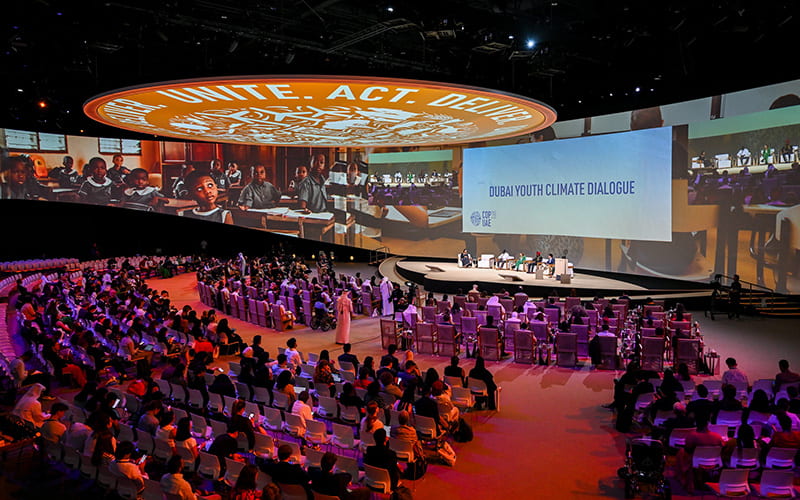Faltering progress: reflections on Action for Climate Empowerment at COP28
By Blog Editor, IOE Digital, on 20 February 2024
Summary
What happened in the UNFCCC Action for Climate Empowerment (ACE) workstream concerned with engaging all citizens in climate change action through education and public participation?

International Youth Climate Delegate Program group at COP28, Dubai. Photo by COP28 / Anthony Fleyhan.
20 February 2024
By Kate Greer and Nicola Walshe
COP28 news coverage focused attention on an agreement to transition away from fossil fuels, plus funding for ‘loss and damage’, but what happened in the UNFCCC Action for Climate Empowerment (ACE) workstream concerned with engaging all citizens in climate change action through education and public participation?
On 7 February, UCL’s Centre for Climate Change and Sustainability Education hosted an online panel to explore what COP28 meant for ACE, climate change education and youth engagement. A panel of five COP28 delegates (Conrad Jeffries, DESNZ; Will Wale, DfE/SOS-UK; Professor Nicola Walshe, IOE; Aman Vernekar, Cambridge University; Quinn Runkle, SOS-UK) shared how they spent their time advocating for these aspects of climate change policy. Their reflections indicated faltering progress within this workstream, but also a sense that their participation at COP had motivated them to continue their efforts.
On a positive note, our panellists were heartened by the growing prominence of education across recent COPs, from the Environment and Education Ministers’ Summit at COP26 in Glasgow, to the launch of the Greening Education Partnership at COP27, and the Youth, Children, Education and Skills Day at COP28 to advocate for the engagement of young people and education’s crucial role in tackling the climate crisis. We also heard about high profile youth policy engagement initiatives, including ‘Presidency Youth Climate Champion’, which institutionalises this role within future COP Presidencies, and the first Youth Stocktake of UNFCCC Processes, carried out by YOUNGO.
However, our panel also raised concern about the need for accountability mechanisms to ensure that governments delivered on the commitments made through these high-profile events. The focus of the formal negotiation space at COP28 relating to ACE was on the annual ACE progress report. This might sound like an innocuous procedural matter; however, unfortunately Parties did not reach agreement on the report, invoking what is referred to as Rule 16. This means that the 2023 report gets carried over to a future meeting, taking time away from discussing other areas of progress.

Dubai Youth Climate Dialogue + Youth Stocktake Outcomes Launch during COP28. Photo by COP28 / Anthony Fleyhan.
A sense that ACE has ‘one foot on the accelerator and the other on the brake’ also came through in relation to youth engagement. While the panellists were positive about the large numbers of youth delegates present at COP28 and felt that young people were being listened to, they voiced concern that commitments in public conversations differed from what was agreed behind closed doors. They also noted the risk that dedicated days can create an impression of comprehensive youth involvement while young people’s participation in formal proceedings can be limited to making summary comments at the end of negotiations. It remains the case that many youth events and spaces are scheduled away from decision-makers. The work to ensure young people’s engagement is meaningful is ongoing.
Issues of accessibility and safety were also highlighted. Despite reports of 84,000 attendees at COP28, the panellists noted that the costs of flights, accommodation, and expenses prohibit many people from attending (including, but not only, young people); this raises questions about who ends up representing the views of heterogenous groups. Discussion of accessibility also focused on people with disabilities, including those with physical disabilities whose participation can be impeded by the physical landscape of COP, as well as LGBTQI+ communities, whose freedoms are restricted in recent host countries (Egypt, UAE) and for 2024, Azerbaijan.
Finally, panellists reflected on how confronting it is to be immersed in stories about the devastating impact that climate change is having on people and communities right now whilst progress at COPs can feel so faltering. Yet, it was clear that being at COP28, amongst so many people who are committed to climate action in their countries, communities and workplaces provided a welcome burst of optimism – not least in relation to ACE.
As Quinn remarked in closing:
“As difficult as COP is, and as depressing as recent headlines have been, I hold hope that education remains a key tenant to driving forward positive change. It’s through education that we can ensure future generations are adequately equipped to address and adapt to climate change. …we also need education to ensure the electorate are well-informed enough to elect and hold to account governments who will take decisive action to achieve a post-carbon economy. And those who are at the sharp edge of the impacts of the climate crisis deserve to understand the absolute injustice they are experiencing in losing their livelihoods, culture, homes and lives to a crisis which they did not contribute to creating. Education is not just about ensuring future citizens are better equipped, it’s also about making sure that the general public worldwide fully grasp what it is that we face so that we may respond swiftly and fairly.”
 Close
Close



